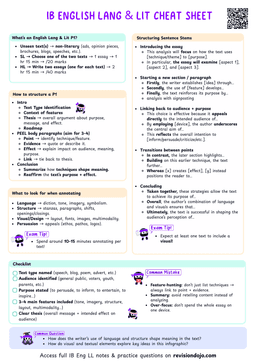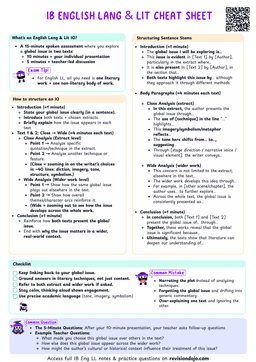Why Clear Writing Wins
- A lot of students think sounding “smart” means writing long, complex sentences packed with big words.
- But writing that way is equivalent to that one friend who never gets to the point.
- Instead of impressing teachers, you frustrate them.
- If your ideas are buried under fluff, you’re not analysing. You’re performing.
- Clear writing is not just about using simple words.
- It's about being precise, concise, and avoiding unnecessary complexity.
What Examiners Want
- Contrary to popular belief examiners aren’t trying to catch you in a "gotcha" moment.
- They’re looking for:
- A clear point
- A precise technique
- A thoughtful insight
- If they can’t follow your thinking easily, they can’t give you marks, even if your ideas are good.
Clarity helps your reader follow your argument without confusion.
Rules of Clear Writing
Say What You Mean. Then Stop.
- Never use a long word if a short one will do.
- Good writing is never about sounding fancy. That's called performance.
- Good writing is about getting to the point.
- Unclear writing: “The poet utilises an abundance of vivid natural imagery in order to symbolically represent the multifaceted nature of human despair.”
- Clear writing: "The poet uses natural imagery to symbolise human despair.”
- The first version is bloated. The second lands with impact.
Be Clinical. Cut The Fluff.
- Fluff is anything that adds no meaning.
- Kill phrases like:
- In my opinion…
- It can be argued that…
- It is important to note that…
- These don’t make your writing more “academic.”
- They make it slower and weaker.
If a word doesn’t serve your meaning, cut it.
Use Active Voice
- Like in 1.6.4, active voice is how you show control.
- Passive voice hides the subject, it makes your analysis sound like things just happen.
- But writers don’t just let things happen. They choose.
- Passive voice: “The theme of loss is explored by the poet.”
- Active voice: “The poet explores the theme of loss.”
Be Specific. Vagueness Kills Analysis
- Don’t just name a technique, explain what it’s doing.
- Using the PEEL framework should force you to do this anyways.
- Stating: “The writer uses symbolism to show a deeper meaning.”
- Explaining: “The broken clock symbolises how time has stopped for the character.”
Strategies for Clear Writing
Use Short, Familiar Words
| Wordy | Clear |
|---|---|
| The author’s utilisation of... | The author uses... |
| Demonstrates a tendency to... | Often shows... |
| Is indicative of... | Suggests... |
- Wordy: In my opinion, the author is trying to convey a sense of isolation through the use of imagery.
- Clear: The author uses imagery to convey isolation.
Cut Unnecessary Words
| Wordy | Clear |
|---|---|
| In my opinion, the poet wants to highlight... | The poet highlights... |
| It can be observed that the imagery suggests... | The imagery suggests... |
| This idea is shown through the use of... | The author shows this idea through... |
Avoid Redundancy
| Redundant | Clear |
|---|---|
| “The author uses imagery to create a visual picture in the reader’s mind.” | “The author uses imagery to create a picture.” |
Use Strong Verbs
| Weak | Strong |
|---|---|
| shows | reveals, exposes, symbolises |
| uses | employs, crafts, selects |
| makes | constructs, builds, heightens |
Try rewriting each sentence clearly and concisely:
- The author uses imagery in order to create a sense of isolation in the reader's mind.
- It can be observed that the protagonist's actions are indicative of his psychological turmoil.
- The theme of regret is explored by the author through the use of setting and tone.
Solution
- The author uses imagery to create a sense of isolation.
- The protagonist’s actions reveal his inner turmoil.
- The author explores regret through setting and tone.


